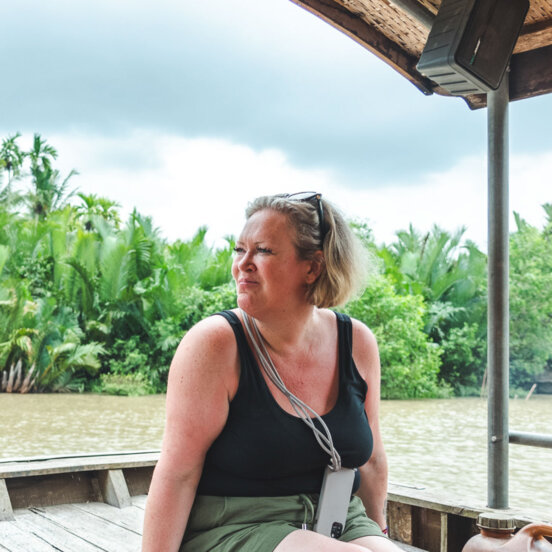How to activate ‘vacation mode’ and enjoy your break from the minute you arrive

When you’re on vacation, doing nothing can mean, well, everything. After all, that’s the entire point of one: to relax, recharge and recuperate. So, why do so many of us struggle to disconnect when we finally arrive at our long-awaited destination?
According to a recent US survey, it takes the average person four days of being on vacation before they finally stop thinking about work. That’s a criminal 57% of a week off when our toes are in the sand but our heads are still in the office. As a result, our moods are at the mercy of the next push notification.

Most vacationers will check their work emails nine times a day
The obvious culprits are, of course, our mobile phones. We all know that ‘relaxing’ by the pool with a phone in hand is like trying to read a book in a football line of scrimmage, yet we still do it. In fact, the study also found that most vacationers will check their work emails a staggering nine times a day as they soak up the sun.
Our brains are clearly hardwired to technology and the stress that shadows it. So, what should we do in order to unplug swiftly, efficiently and, most importantly, immediately when we’re away?

Your priority on arrival should be to dive straight in
First of all, find the cheat codes; there are plenty of short cuts to help shift our brains into ‘vacation mode’ as quickly as possible. Start with your first question when checking into your hotel. This should not, as is most common, be about WiFi access. Instead ask the way to the pool or beach.
Research has shown that just three minutes spent in cold water has an anti-inflammatory effect which helps to reduce stress levels. Therefore, your priority on arrival – as soon as you’ve dropped your bags – should be to dive straight in and wash away the worries of the real world, either with a dip or, at the very least, a cool shower or bath.

Leave your smart watch in the safe, too
Your next ally is the safe in your hotel room. It’s a smart move to stash your phone but it’s even smarter if you remove the sim card first – this adds an extra level of psychological distance. Better still, leave your smart watch in the safe, too. Not only will this help you feel unshackled from the rules and expectations of office life but it’ll also help you avoid any dodgy tan lines.
There are also elements that help ignite that feeling of ‘vacation’ that you can bring from home. One of my friends, Dominic, swears by his ‘vacation aftershave’ (it’s Dior Sauvage, for anyone wondering), a scent he only ever wears when he’s away. As soon as he smells it, he feels an immediate sense of relaxation.

Continuous attention-shifting keeps you in your work mindset
Many organisational psychologists believe the most important preparation for creating a successful vacation mindset is a decisive out-of-office. Not because of the messages you might miss while you’re away but because of the potential problems that could arise in your inbox in your absence. This can lead to constant checking in.
“The idea that you might get an email so important it can’t wait until you’re back and the constant worrying about being connected seems to be most damaging,” says Bill Becker, an associate professor at Virginia Tech’s Pamplin College of Business. “Continuous attention-shifting keeps you in your work mindset and doesn’t allow you any time to disconnect and recharge.”

It doesn’t hurt to add a ‘buffer day’ to your return
The solution, according to Becker and others, is to set a robust message, not warning that you will be slower to respond while you’re away but stating that you are out of contact for the duration of your trip. Also, provide the contact details of at least two colleagues who are in the office and happy to take the reins.
It doesn’t hurt to add a ‘buffer day’ to your return, either. That way, you’ll always be back at your desk a day before your out-of-office says you are, giving you time to catch up on your messages and manage any stress levels.
Of course, feeling relaxed isn’t just about what you’re getting away from; it’s also about what you’re going to. And that’s why it’s an excellent idea to set yourself a get-up-and-go challenge on the first full day of your trip – a sort of control-alt-delete into your new environment.

You’ve earned your vacation and you deserve it
Research shows that physical activities during vacations improve health and wellness far more than passive activities like hanging out by the pool. Also, the cathartic effect produced by exercise-related hormones like epinephrine (adrenaline) and norepinephrine (vital to the fight-or-flight response) are also shortcuts to relaxation. So, rather than booking a massage on your first morning or taking it easy, try hiking, kayaking or swimming. Anything to get your blood pumping in the fresh air (Flash Pack trips are perfect for these early jumpstarts, from river rafting in Costa Rica to the sunset summit scramble in Sri Lanka).
The crucial thing to remember is that you’ve earned your break and you deserve it. Not only that, but the more you embrace it, the more your co-workers will thank you for it when you get home. According to research by Headspace, a good vacation recharges people for at least two weeks after returning to work – so, switching your brain to ‘vacation mode’ as soon as you arrive is not only best for your mind and body, but it’s also good for your career.
Award-winning writer, Jonathan Thompson, is a regular SOLO columnist. Find out more about Flash Pack adventures right here.
Got a story or adventure that could inspire a solo traveler like you? Tag @flashpack on social or email [email protected] to be featured.
Images: Courtesy of Jonathan Thompson & Flash Pack










